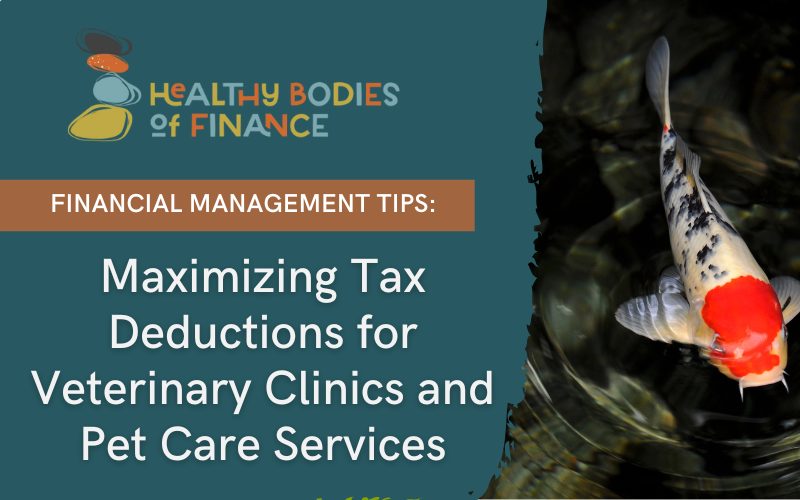Dear Dangerously in Love with Finance,
I run a veterinary clinic in a suburban area, located in Tacoma, Washington. While I love taking care of animals, tax season is always a stressful time for me. I’m sure I’m not the only vet who feels this way!
I know there are specific deductions we can claim as part of running a veterinary practice, but I’m worried I’m leaving money on the table because I don’t fully understand the rules. For instance, I’ve recently purchased new medical equipment, upgraded the clinic’s software, and even renovated our waiting room to make it more pet- and client-friendly.
Can you give me a rundown of the key tax deductions that I should be aware of as a veterinary professional? Also, are there any less obvious write-offs that could make a difference?
Thanks for your advice,
Tax-Tense in Tacoma
Dear Tax-Tense in Tacoma,
You’re not alone! Keeping up with deductions can be a daunting task, but understanding your eligible deductions can make a world of difference for your bottom line. Veterinary clinics and pet care services fall into a unique category with many tax-saving opportunities. Let’s break it down into the essentials.
1. Medical Equipment and Supplies
Since you mentioned purchasing new medical equipment, you’ll be happy to know that these expenses are fully deductible. Under Section 179 of the IRS tax code, you can deduct the full purchase price of qualifying equipment in the year it was purchased, rather than depreciating it over several years. This includes items such as:
Even smaller items like syringes, bandages, and pet medication can be written off as supplies.
2. Clinic Renovations and Improvements
Your waiting room upgrade qualifies as a deduction too! Repairs and maintenance (e.g., repainting walls, fixing plumbing) are immediately deductible. However, larger improvements—like remodeling or expanding your clinic—might fall under a depreciation schedule.
For example, if you replaced flooring or added built-in cabinetry, these improvements could be deducted over several years as part of your clinic’s property value. Be sure to discuss this with your tax professional to categorize these expenses correctly.
3. Veterinary Software and Technology

Software upgrades, including cloud-based practice management systems, are also deductible. Whether it’s for appointment scheduling, inventory management, or telemedicine services, these tools are essential to your business operations and can be written off as a business expense.
If you’re using telecommunication tools or upgrading your internet service to support remote consultations, those costs are also fair game for deduction.
4. Employee Salaries and Benefits
Running a veterinary clinic often involves a team of professionals, including veterinary technicians, receptionists, and kennel staff. Wages, salaries, and even employee benefits (like health insurance and retirement contributions) are deductible expenses.
Pro tip: If you pay for staff training, certifications, or continuing education, those expenses qualify for deductions as well.
5. Continuing Education and Professional Dues
Speaking of education, your own continuing education courses—whether online or in-person—are deductible. This includes conference fees, travel expenses to attend professional development events, and even books or resources related to your practice.
Additionally, memberships to professional organizations like the American Veterinary Medical Association (AVMA) are fully deductible as business expenses.
6. Marketing and Advertising
Do you run a website for your clinic, place ads in local newspapers, or use social media to promote your services? Expenses for designing, maintaining, and advertising your services are tax-deductible. This includes website hosting fees, printing brochures, or even hiring a social media manager.
7. Vehicle Expenses
If you use a vehicle for business purposes—such as making house calls, delivering pet food or supplies, or transporting equipment—you may deduct mileage, gas, insurance, and maintenance costs. Be sure to keep a detailed mileage log and receipts to substantiate your claim.
8. Pet Boarding and Grooming Services
If your clinic provides ancillary services like boarding or grooming, the costs associated with maintaining these services (such as equipment, shampoos, and bedding) are also deductible.
For example, if you purchased a new grooming station or upgraded the kennel area, those expenses should be accounted for during tax season.
9. Home Office Deduction (If Applicable)
If part of your veterinary work is conducted from a home office—such as handling billing, client communications, or telehealth consultations—then you may be eligible for a home office deduction. Just ensure the space is used exclusively for business purposes.
Less-Obvious Write-Offs to Consider
Here are a few lesser-known deductions that might surprise you:
By staying proactive and informed, you’ll not only reduce your tax burden but also reinvest those savings back into your clinic for the benefit of your patients and staff.
I hope this helps and if you have any additional questions or need a CFO that specializes in Veterinary Clinics and Pet Care Services, please reach out…
As this is what we do…..
Yours truly,
Dangerously in Love with Finance
Your Veterinary Clinics and Pet Care Services CFO
Mindful Financial Tips:
Maximizing tax deductions is not just about saving money—it’s about creating opportunities to reinvest in your clinic and elevate the care you provide to your clients and their beloved pets.
By keeping meticulous financial records, working with a qualified professional, and considering specialized CFO services tailored for veterinary clinics and pet care businesses, you can gain deeper insights into your practice’s financial health.
A veterinary-focused CFO service can help streamline your accounting processes, identify additional savings, and develop strategies to manage cash flow, enabling you to focus on what you do best—caring for animals—while ensuring your clinic thrives financially.

Maximizing Tax Deductions for Your Veterinary Clinic or Pet Care Service
Accounting doesn’t have to feel overwhelming. Understanding your eligible deductions can significantly boost your bottom line.
At Healthy Bodies of Finance, we specialize in helping veterinary clinics and pet care services unlock tax-saving opportunities.
Contact us today to learn how we can help you:
Let’s ensure your practice thrives with a smart, strategic tax approach!
This article is designed to provide information only and should not be considered legal or tax advice. Because of the complexity of the law and the variables in your own personal tax and accounting situation, you can’t rely on our advice specifically related to your unique circumstances. In order to get the best tax savings and legal advice available to you, you should consult with your own accountant, attorney or advisor regarding your particular facts and circumstances. Healthy Bodies of Finance is an accounting firm that specializes in working with health and wellness providers. We provide monthly accounting & bookkeeping services and financial education. For more information on our specialized services for health and wellness providers please contact us at info@healthybodiesoffinance.com
